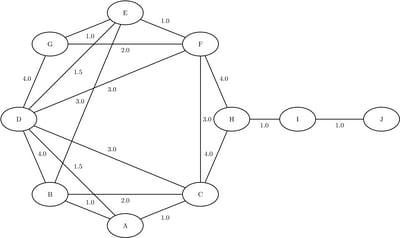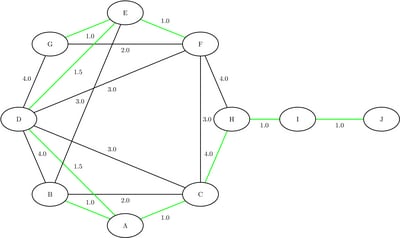The Network Solver
- Overview
- Getting Started
-
Syntax

-
Details
 Input Data for the Network SolverSolving over Subsets of Nodes and Links (Filters)Numeric LimitationsBiconnected Components and Articulation PointsCliqueConnected ComponentsCycleLinear Assignment (Matching)Minimum-Cost Network FlowMinimum CutMinimum Spanning TreeShortest PathTransitive ClosureTraveling Salesman ProblemMacro Variable _OROPTMODEL_
Input Data for the Network SolverSolving over Subsets of Nodes and Links (Filters)Numeric LimitationsBiconnected Components and Articulation PointsCliqueConnected ComponentsCycleLinear Assignment (Matching)Minimum-Cost Network FlowMinimum CutMinimum Spanning TreeShortest PathTransitive ClosureTraveling Salesman ProblemMacro Variable _OROPTMODEL_ -
Examples
 Articulation Points in a Terrorist NetworkCycle Detection for Kidney Donor ExchangeLinear Assignment Problem for Minimizing Swim TimesLinear Assignment Problem, Sparse Format versus Dense FormatMinimum Spanning Tree for Computer Network TopologyTransitive Closure for Identification of Circular Dependencies in a Bug Tracking SystemTraveling Salesman Tour through US Capital Cities
Articulation Points in a Terrorist NetworkCycle Detection for Kidney Donor ExchangeLinear Assignment Problem for Minimizing Swim TimesLinear Assignment Problem, Sparse Format versus Dense FormatMinimum Spanning Tree for Computer Network TopologyTransitive Closure for Identification of Circular Dependencies in a Bug Tracking SystemTraveling Salesman Tour through US Capital Cities - References
Consider the problem of designing a small network of computers in an office. In designing the network, the goal is to make sure that each machine in the office can reach every other machine. To accomplish this goal, Ethernet lines must be constructed and run between the machines. The construction costs for each possible link are based approximately on distance and are shown in Figure 9.74. Besides distance, the costs also reflect some restrictions due to physical boundaries. To connect all the machines in the office at minimal cost, you need to find a minimum spanning tree on the network of possible links.
Define the link data set as follows:
data LinkSetInCompNet; input from $ to $ weight @@; datalines; A B 1.0 A C 1.0 A D 1.5 B C 2.0 B D 4.0 B E 3.0 C D 3.0 C F 3.0 C H 4.0 D E 1.5 D F 3.0 D G 4.0 E F 1.0 E G 1.0 F G 2.0 F H 4.0 H I 1.0 I J 1.0 ;
The following statements find a minimum spanning tree:
proc optmodel;
set<str,str> LINKS;
num weight{LINKS};
read data LinkSetInCompNet into LINKS=[from to] weight;
set<str,str> FOREST;
solve with NETWORK /
links = (weight=weight)
minspantree
out = (forest=FOREST)
;
put FOREST;
put (sum {<i,j> in FOREST} weight[i,j]);
create data MinSpanTree from [from to]=FOREST weight;
quit;
Output 9.5.1 shows the resulting data set MinSpanTree, which is displayed graphically in Figure 9.75 with the minimal cost links shown in green.

